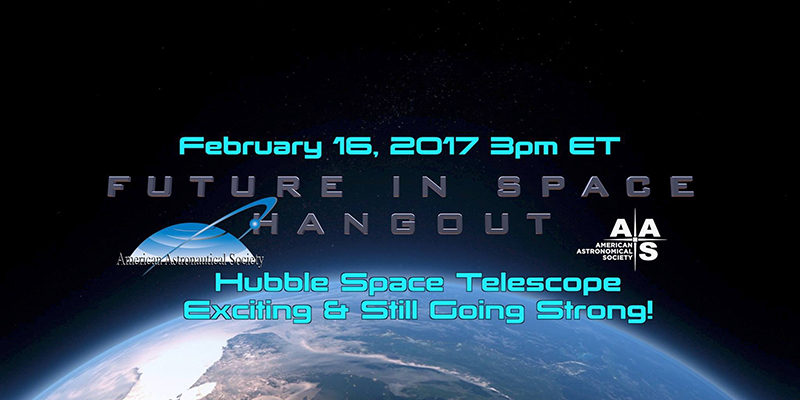Future in Space Hangout 16 February: Hubble Space Telescope
Alberto Conti BAE Systems, Inc.
Hubble – Exciting and Still Going Strong!
Future In Space Hangout
The Hubble Space Telescope, one of the greatest scientific instruments of all time, is well into its second quarter-century of successful operation with years of exciting results ahead. Join regular hosts Tony Darnell, Alberto Conti, and Harley Thronson on Thursday, 16 February, at 3:00 pm ET as they discuss the latest science, instruments, and imagery of this iconic observatory with Jennifer Wiseman and Olivia Lupie (both of NASA Goddard) and Zolt Levay (Space Telescope Science Institute).
The best place to hangout with us will be on YouTube, broadcast on the Deep Astronomy Channel. You can also take part in the live chat which will open one hour before the hangout, RSVP on the Facebook event page, and join the conversation on Twitter with #FutureInSpace. Archives of previous hangouts in this series can be found in a Deep Astronomy YouTube playlist.

What Are Afternoon Astronomy Coffee and Future in Space Hangouts?
Future In Space” and "Afternoon Astronomy Coffee" Hangouts are part of a weekly series, held every Thursday, that also includes a segment on Footsteps to Mars. We bring the the latest research in astronomy, highlights from the future of space astronomy and astronautics planning, as well as updates on the exploration of Mars to you every week via Hangouts on Air. With the cooperation of both the American Astronomical Society (AAS) and the American Astronautical Society (the other AAS), our hosts Tony Darnell, Carol Christian, Alberto Conti, and Harley Thronson bring you topics that examine today's breakthroughs in research and look forward to peer into the unfolding possibilities of what we may learn about the universe and Mars exploration. We join with members of the American Astronomical Society to chat, in an informal online setting modeled after "science coffee" events held in universities and research organizations across the country. We will examine what we hope to learn about exoplanets, black holes, the early universe, quasars, and life in the universe along with what technologies might help us — and reflect upon the scientific endeavors occurring today that uncover amazing astrophysics and lay the groundwork for studies to come.
We will also explore the technology and engineering used today as well as possibilities for future space travel and research with members of both Societies, and probe what our future in space may look like and how we might get there. We will examine the underlying technologies of space telescopes, orbiters, landers, and human space vehicles now and in the years to come. We will delve into topics that help us understand the possibilities and limitations of human space flight and eventual human colonization of other worlds.
We hope you can join us each month as we bring experts from both Societies — people who think about and plan for our future in space — to your computer, tablet, or smartphone. We invite you to bring your questions and comments and get ready to learn about the amazing possibilities for the future of space astronomy and exploration.

